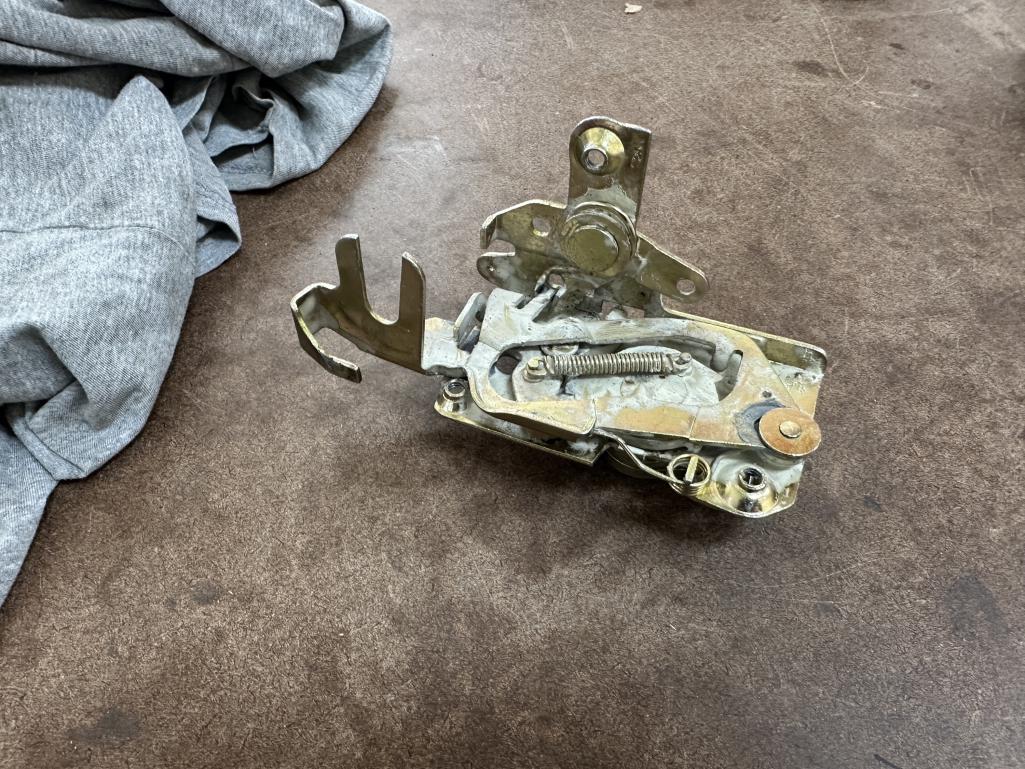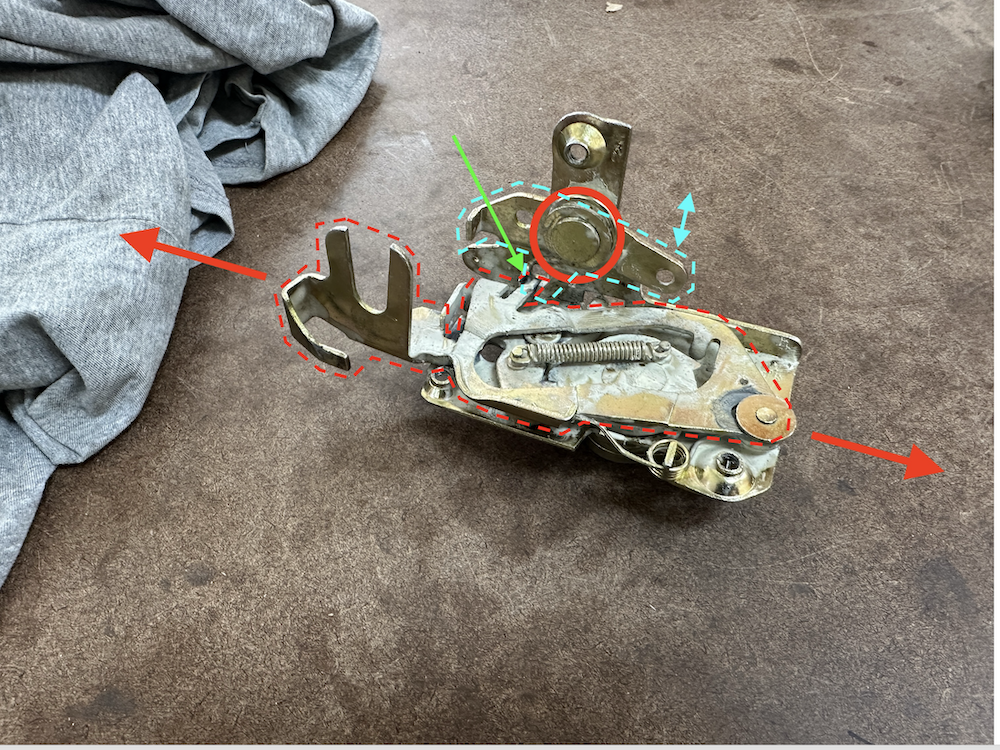|
|

|
Porsche, and the Porsche crest are registered trademarks of Dr. Ing. h.c. F. Porsche AG.
This site is not affiliated with Porsche in any way. Its only purpose is to provide an online forum for car enthusiasts. All other trademarks are property of their respective owners. |
|
|
  |
| bkrantz |
 Jun 22 2025, 06:43 PM Jun 22 2025, 06:43 PM
Post
#1
|
|
914 Guru      Group: Members Posts: 8,411 Joined: 3-August 19 From: SW Colorado Member No.: 23,343 Region Association: Rocky Mountains 
|
Mine is too stiff, I think. Oh, the thing I mean is the internal door latch mechanism. And the part that seems stiff is the locking function.
In case your never spent any intimate time with the mechanism, the locking function is done by a stamped plate that shifts up (to lock) and down (to unlock). I continue to have problems unlocking the doors with keys, even after Curt did his magic on the cylinders. Since the up-down shift of the locking plate is accomplished by the little lever on the internal end of the cylinder, as twisted by the key, so it would seem to be better if the plate shifted without much resistance. Oh, and I have tried some different lubes. Attached thumbnail(s) 
|
| 76-914 |
 Jun 22 2025, 07:07 PM Jun 22 2025, 07:07 PM
Post
#2
|
|
Repeat Offender & Resident Subaru Antagonist           Group: Members Posts: 13,730 Joined: 23-January 09 From: Temecula, CA Member No.: 9,964 Region Association: Southern California 
|
Mine is too stiff, I think. Oh, the thing I mean is the internal door latch mechanism. And the part that seems stiff is the locking function. In case your never spent any intimate time with the mechanism, the locking function is done by a stamped plate that shifts up (to lock) and down (to unlock). I continue to have problems unlocking the doors with keys, even after Curt did his magic on the cylinders. Since the up-down shift of the locking plate is accomplished by the little lever on the internal end of the cylinder, as twisted by the key, so it would seem to be better if the plate shifted without much resistance. Oh, and I have tried some different lubes. I remember (IMG:style_emoticons/default/sheeplove.gif) with that Bob. Let me get a look at one in my stash so I can better describe the issue I had. I remember it was a spot that served to anchor a part while providing a rotational pivot point. Metal to metal. No amount of cleaning, soaking or oiling helped much or for any amount of time. (IMG:style_emoticons/default/beerchug.gif) |
| mlindner |
 Jun 23 2025, 08:02 AM Jun 23 2025, 08:02 AM
Post
#3
|
|
Senior Member    Group: Members Posts: 1,686 Joined: 11-November 11 From: Merrimac, WI Member No.: 13,770 Region Association: Upper MidWest 
|
I had the same problem for years. After I had the car complete the locks came out cleaned, lubed.....still stiff. I did not need the locking portion so I took that locking spring off. Problem went away, just FYI
|
| mmichalik |
 Jun 23 2025, 09:16 AM Jun 23 2025, 09:16 AM
Post
#4
|
|
MikeM    Group: Members Posts: 765 Joined: 27-January 16 From: Valley Center, CA Member No.: 19,600 Region Association: Southern California 
|
I had the same issue with my 75. I took the same mechanism out and thoroughly cleaned it using a toothbrush and a metal dental pick.
The 50 year old grease on mine was as hard as a rock but once I cleaned it and relubed it, it was like new. Not sure if you did that already so I thought I would throw it out there |
| bkrantz |
 Jun 23 2025, 11:29 AM Jun 23 2025, 11:29 AM
Post
#5
|
|
914 Guru      Group: Members Posts: 8,411 Joined: 3-August 19 From: SW Colorado Member No.: 23,343 Region Association: Rocky Mountains 
|
Thanks, guys. Here is an annotated version of the photo that shows what I think is going on.
The dashed red outline is the locking plate. This is attached to the main latch base only at the bottom (right side) by a permanent rivet, with the large circular washer. The locking plate shifts up and down (left and right--red arrows). The locking plate also rotates around the rivet, which is how lifting the outer door handle unlatches the closed door. As it does so, it also rotates the lever (dashed blue outline) which then moves the long rod on the door forward or back (blue arrow). The rod connects to the inside door lock button that either sits flush with the inside handle or pokes out. Of course this linkage also works in reverse, and moving the inside lock button moves the rod which moves the lever (blue outline) which shifts the locking plate (red outline) up or down. The green arrow shows where the locking plate and door bar level meet. First of all, what mad scientist came up with this design? Did the Porsche/Karmann families have some clever but insane cousin they kept locked in the basement? Second, the resistance to shifting the locking plate seems to be (1) the lower pivot (rivet), (2) the pivot for the locking bar rod lever, and (3) the drag along the long rod and and internal door lock button plus the miscellaneous contacts of all the parts. On this latch I am pretty sure the lower pivot is pretty loose. I am not sure about the rod lever pivot. I will check that out. My concern is that twisting the key, which rotates the little arm on the inside of the cylinder, has to do LOTS of work, and can bind. Third, do I really need the internal door lock button to function? If not, at least I can at least disconnect the rod, and the drag of all the stuff "downstream". I could even disconnect the rod lever (as mlinder suggested)--just by removing the spring? Attached image(s) 
|
| Chris914n6 |
 Jun 23 2025, 12:20 PM Jun 23 2025, 12:20 PM
Post
#6
|
|
Jackstands are my life.     Group: Members Posts: 3,485 Joined: 14-March 03 From: Las Vegas, NV Member No.: 431 Region Association: Southwest Region |
You didn't say what you used to clean and grease. WD40 works great at softening the old grease. Spray and work the mechanism til it's effortless. White lithium is pretty much the goto for everything these days.
|
| ClayPerrine |
 Jun 23 2025, 12:59 PM Jun 23 2025, 12:59 PM
Post
#7
|
|
Life's been good to me so far.....                Group: Admin Posts: 16,410 Joined: 11-September 03 From: Hurst, TX. Member No.: 1,143 Region Association: NineFourteenerVille 
|
An addendum.
About every 2 years or so I pull them, clean them, regrease them and reinstall them. I also pull the door lock cylinders from the outer handles to for cleaning and lubrication. That keeps the release cam on the outer door handle from breaking. I just clean them with spray Berrymans B-12. Then let them dry and regrease them with white lithium grease. |
  |
2 User(s) are reading this topic (1 Guests and 0 Anonymous Users)
1 Members: chmillman

|
Lo-Fi Version | Time is now: 23rd June 2025 - 02:53 PM |
Invision Power Board
v9.1.4 © 2025 IPS, Inc.









